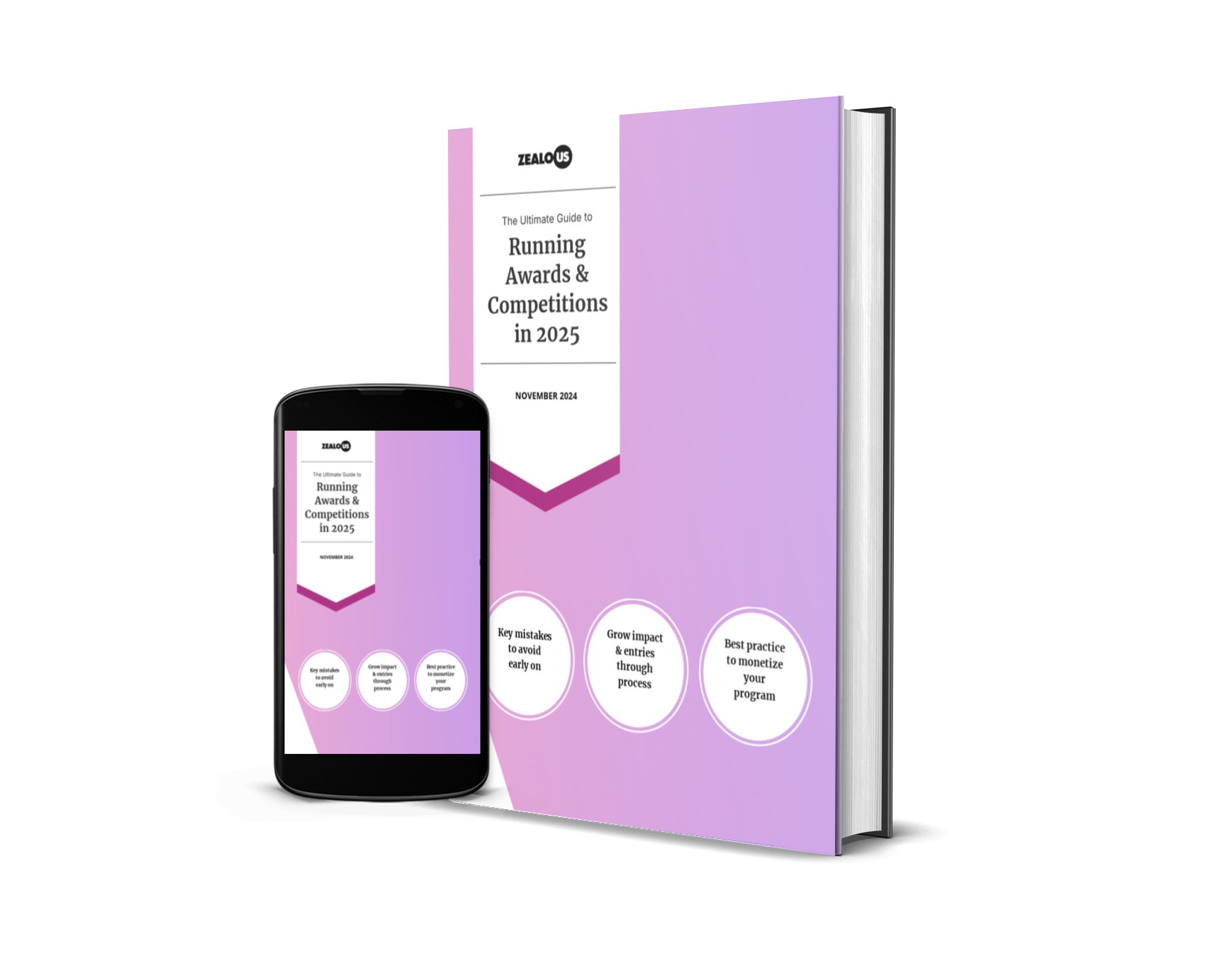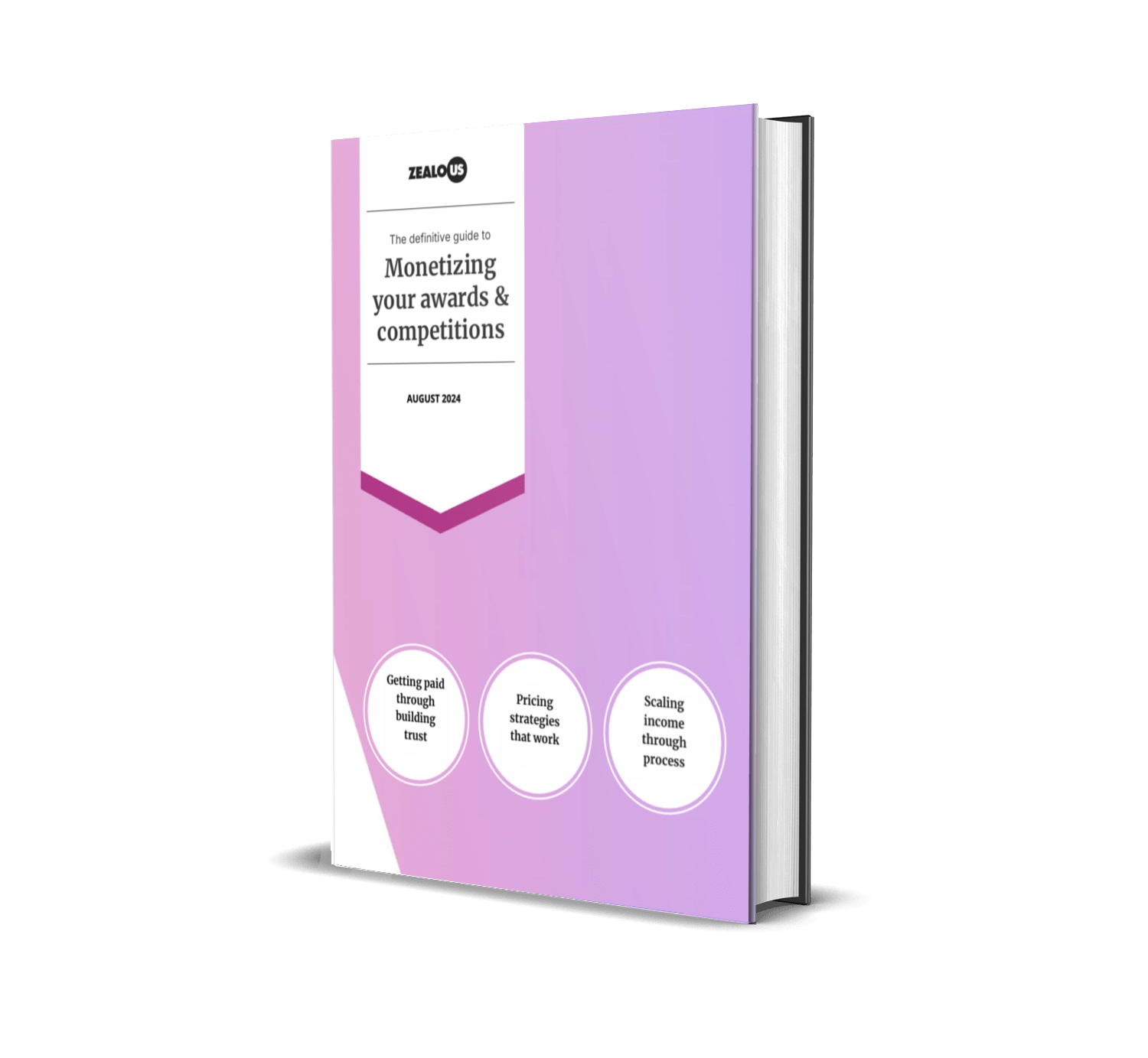This article covers:
- What the journey is for your entrants
- Understanding timings
- Creating a message
- How to catch attention and create urgency
If a tree falls in a forest and no one hears it, does it make a sound?
No matter how expertly crafted your awards and competitions are, they will need strategic award marketing to succeed. Whether you’re promoting industry recognition programs or creative competitions, you need to make sure the right people know your opportunity exists.
The number of entries you receive depends heavily on your marketing efforts.
This guide will take you through our top tips for getting seen and receiving more entries even when budgets are tight.
Understand the journey
Candidates go on a journey when applying to your programme.
Their journey starts when they first come across your competition and continues as they visit your site, upload work, fill in forms, pay, etc. Potential candidates will drop off at each step of this process.
Although this article focuses on how a candidate is made aware of your opportunity (the first step), you need to know that analysing the complete journey could save you money on marketing.
If ten out of one hundred candidates who visit your site apply instead of one out of one hundred, you could reduce your marketing by 90% to get the same result.
Do potential candidates visit your site? Are you losing them before they submit? Then revisiting your process and editing the steps leading to the most dropouts may be a better use of your resources.
The Basics
Whether you’re running award marketing campaigns or promoting competitions, the fundamentals remain the same. Marketing is about getting the right people to see the right message at the right time.
- The wrong people won’t apply or submit irrelevant content.
- The right people will ignore the wrong message.
- The wrong timing may mean the right people don’t see your message or don’t engage immediately (and probably forget about you).
Mastering the above will positively impact the quality and quantity of submissions you receive.
Efficient marketing is about putting the right message in front of the right people at the right time.
Timing is everything
It’s easy to focus solely on the structure of your competition before submissions open and only begin thinking about marketing as submissions open.
Don’t.
Doing so will lead to you wasting an opportunity to create marketing opportunities in your process.
As a rule of thumb, marketing should make 30% of your time during the planning stage, rising to 70% when submissions open.
When planning, review your schedule and identify the marketing opportunities it offers. For example:
- Announcing your programme
- Submissions opening soon
- Submissions opened
- Great submissions received
- New judge announcement
- New prize announcement
- Early bird price closing soon (or any other special deals)
- Submissions closing soon
- Submissions extended
- Public vote starts
- Award ceremony announcement (for programs with ceremonies)
- Past winner spotlights (showcase previous award recipients)
- Industry partner announcements (for award sponsors/supporters)
- Award category reveals (if announcing categories in phases)
Knowing key dates in advance will allow you to begin crafting messages and imagery to share in advance.
Award Marketing vs Competition Marketing
While awards and competitions share many marketing principles, they often require slightly different messaging strategies:
Awards focus on recognition and prestige – Award marketing typically emphasizes the honor of being selected, industry recognition, and career advancement opportunities.
Competitions focus on challenge and achievement – Competition marketing often highlights the skill test, creative challenge, or opportunity to prove abilities against peers.
Awards have longer legacy impact – Unlike competitions with immediate winners, awards create ongoing professional credibility. Highlight how past winners have benefited months or years later.
Competitions create immediate excitement – Competition marketing can leverage real-time engagement, leaderboards, and the thrill of head-to-head comparison.
Award ceremonies vs competition events – Awards often culminate in formal ceremonies creating additional marketing moments, while competitions might focus more on the contest itself and immediate results.
Industry credibility varies – Award marketing should heavily feature judge credentials and organizational authority, while competition marketing might emphasize fairness, challenge difficulty, or prize value.
Understanding these nuances helps you craft more targeted messaging whether you’re running industry recognition programs or creative competitions.
People First
Knowing who you want to engage with your offer will establish how you will market to them.
Where do your targeted candidates hang out? Is it online or offline? Do they engage with specific communities? Are you organising an award aimed at a section of society over 80 years old? TikTok is not the answer.
Always ask yourself where do potential candidates hang out
Fostering diversity & inclusion
Where you place your message will directly impact who applies. If your submissions lack diversity, your marketing likely shows in locations serving the same types of people.
Eyes on the prize(s)
Before spending resources on getting the message out, you need to establish “what the message” is.
Remember, the message isn’t for you; it’s for your candidates.
Knowing who your candidates are and viewing the world through their eyes will keep your message as concise and relevant as possible. If you want to appeal to different types of people, you may wish to use separate “messaging” to target each group.
The messages below all cover the same competition. Try and reverse engineer them to establish what types of candidates would be more attracted to which one.
- “Be part of an exhibition challenging mental health stigma.”
- “Get your work seen at an exhibition celebrating works based around mental health.”
- “Is mental health important to your creative practice? Submit your work for a chance of winning £1,000.”
- “Win £1,000 with art themed around mental health.”
If you have a budget, you can draft multiple messages and test how efficient each is by A/B testing an advert.
A/B testing will allow you to put out two messages simultaneously and measure which performs better. Creating a test earlier in the process lets you refine your message before spending time and money getting it out there.
Imagery matters
With most marketing channels being visual, the images you place alongside your copy are fundamental in getting attention.
You have 2 seconds to catch someone’s attention.
Imagery is the first element a potential candidate will see. All images must be of high quality and impactful. Don’t fill images up with writing (that’s what the copy is for!); instead, focus on visuals to catch someone’s attention, a hook to get them to read the text accompanying it.
The imagery you use should be reflected across the entire journeys candidates take to submit.
If you put a picture of a kitten on Twitter to catch someone’s attention, but there are no kittens in sight on the webpage they visit, their experience will be jarring, and they may drop out.
Making sure the imagery shares a common DNA across your competition builds trust and leads to more successful submissions.
It’s also worth noting some social media platforms are now moving away from static images into video (at present, Instagram rewards film and penalises pictures). You might be able to reach a wider audience for cheaper if you check what kind of content a specific service rewards before planning your media.
Create Urgency
“Submissions close in 100 days” is unlikely to lead to candidates taking action.
Without a sense of urgency, humans will procrastinate. With good marketing across the lifetime of your opportunity, more than 50% of entries will be submitted in the last three days before submissions close.
Luckily some strategies allow you to create urgency even when the closing date is a long way away. These could be to:
- Create early bird fees to inspire people to submit early for a discount (for calls with a submission fee).
- Create late comer fees to ensure people apply on time (can be used to generate income for calls without a submission fee).
- Offer to celebrate candidates on your social media feeds if they are the first 100 to submit (also works as a giveaway).
- Limit the number of entries accepted to your competition (switches the focus away from the deadline to the fear of missing out).
- Create an initial deadline, which you will extend (do this only once, else you will look like no one submitted and lose credibility).
Shoestring Budgets
It is possible to market without a budget, but you will need more time and will get the best results when you plan it.
The best way to market without a budget is to build a network of like-minded organisations/individuals who serve a similar audience to you before you open submissions.
Build a relationship with them, and offer to share their content in exchange for them sharing yours. If your purposes are heavily aligned, you may be able to grow your ambition and go after larger organisations.
This strategy also allows you to diversify the types of people that will come across your award by picking diversity in the communities that share your message.
It’s also worth listing your award, competition, residency, etc. on free listing websites serving the candidates you wish to target.
Once you’ve spread the word, you’ll need a streamlined way to manage all those incoming submissions and keep track of your awards program.
Conclusion
Award marketing is pivotal in getting submissions and growing the impact of your recognition programs. The more people see your award, the more people will submit.
Simplifying the journey for candidates will also increase the chances of someone applying, which may allow you to reduce marketing budgets or increase your ambitions.
The marketing landscape changes constantly, but remembering that efficient marketing is about putting the right message in front of the right people at the right time will ground you into making better decisions.
Let us know you want us to write more content like this with a love!
Share

Guy Armitage is the founder of Zealous and author of “Everyone is Creative“. He is on a mission to amplify the world’s creative potential.




